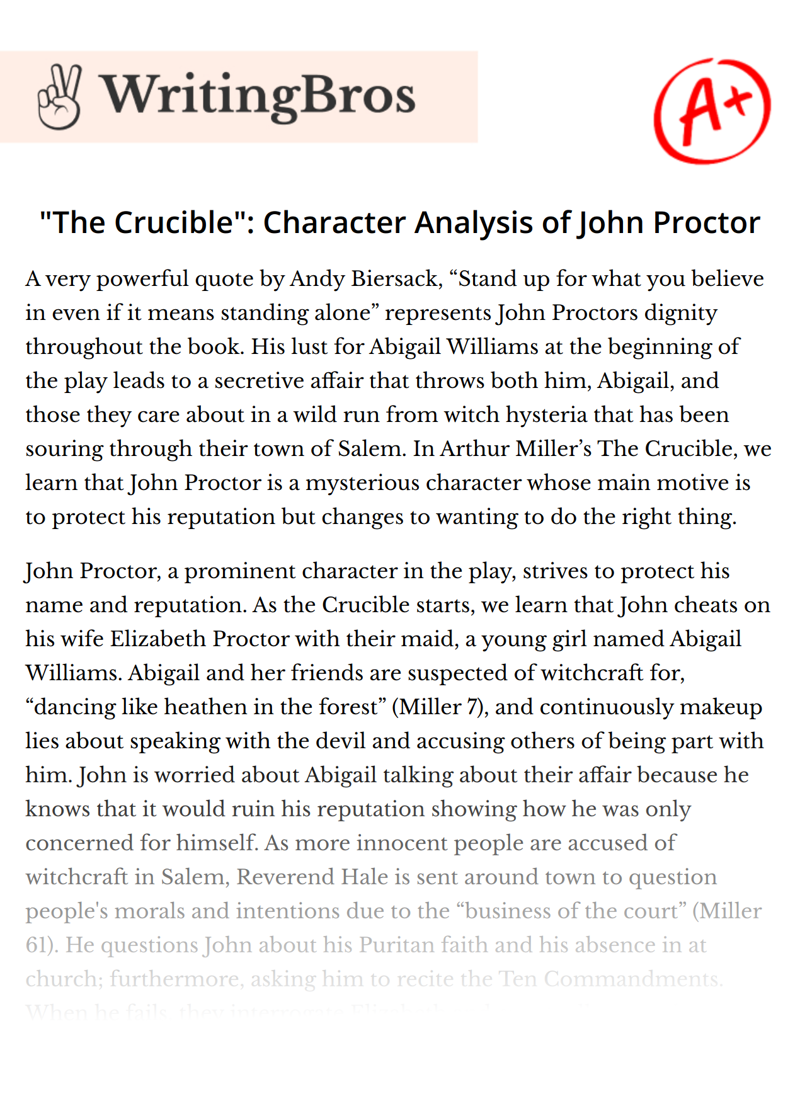"The Crucible": Character Analysis of John Proctor

A very powerful quote by Andy Biersack, “Stand up for what you believe in even if it means standing alone” represents John Proctors dignity throughout the book. His lust for Abigail Williams at the beginning of the play leads to a secretive affair that throws both him, Abigail, and those they care about in a wild run from witch hysteria that has been souring through their town of Salem. In Arthur Miller’s The Crucible, we learn that John Proctor is a mysterious character whose main motive is to protect his reputation but changes to wanting to do the right thing.
John Proctor, a prominent character in the play, strives to protect his name and reputation. As the Crucible starts, we learn that John cheats on his wife Elizabeth Proctor with their maid, a young girl named Abigail Williams. Abigail and her friends are suspected of witchcraft for, “dancing like heathen in the forest” (Miller 7), and continuously makeup lies about speaking with the devil and accusing others of being part with him. John is worried about Abigail talking about their affair because he knows that it would ruin his reputation showing how he was only concerned for himself. As more innocent people are accused of witchcraft in Salem, Reverend Hale is sent around town to question people's morals and intentions due to the “business of the court” (Miller 61). He questions John about his Puritan faith and his absence in at church; furthermore, asking him to recite the Ten Commandments. When he fails, they interrogate Elizabeth and eventually arrest her for supposedly stabbing Abigail, who has accused her of witchcraft. Although John believes strongly about his reputation in the town, he beings to realize that he needs to protect his family no matter what it takes.
John Proctor, whose main motive is to protect his reputation, begins to realize that he wants to be the better man to prove those accused are innocent to save his wife and protect his family. After Elizabeth is taken, John tries to get Marry Warren to confess in court to Judge Danforth and prove Elizabeth is a truthful woman. Instead, Marry feels manipulated by Abigail and ends up accusing John Proctor of being with the devil. John is later arrested although he is not allied with the devil, he says “God is dead” (Miller 115). John finally shows goodness in his heart by not confessing to witchcraft at the end of the play and choosing to rip up his false confession. John chooses to die knowing the truth rather than live with a lie because he wanted to give hope to others that they can stop the murders of innocent people. At the end of the Crucible, we learn that John’s motive was to protect his reputation because he wanted to prove that he was a good man and do the right thing to save the people he cared about.
In the Crucible people of Salem were quick to judge people who were different or looked different just like people of the modern world who judge those who are disabled or have diseases that affect them physically. In Nia Sims' article, Disabilities are not always obvious. Don't judge us without knowing the full story, she says “How we see ourselves and how we are perceived by others is very closely linked”. This means that the way other people see or judge us affects how we see and judge our self. The people of Salem were quick to judge anyone different because they always listened to what other people said about them. Those people accused gave into a false confession because those around them pressured them into thinking that they had to save themselves. The difference between John Proctor and those who confessed was that he stood up for what he believed in and was strong just like those who face the judgment of other people and prove them wrong.
In Arthur Miller’s The Crucible, John Proctor worries about protecting his reputation but changes to wanting to fight to do the right thing and prove he is a good man to his family and the town of Salem. He has an affair with Abagail Williams who accused his wife, Elizabeth Proctor of witchcraft to have John to herself. This leads to a huge dispute and series of the hanging of those who are allied with the devil or those who are truly innocent. In the end, John realizes that if he cares so much about his reputation, he wants others to know that he is truly a good man and was not going to confess if they knew that he was lying. He wanted to show strength rather than weakness.
Cite this Essay
To export a reference to this article please select a referencing style below

